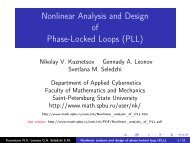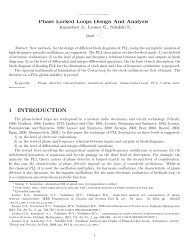Technical Sessions – Monday July 11
Technical Sessions – Monday July 11
Technical Sessions – Monday July 11
Create successful ePaper yourself
Turn your PDF publications into a flip-book with our unique Google optimized e-Paper software.
TA-06 IFORS 20<strong>11</strong> - Melbourne<br />
� TA-06<br />
Tuesday, 9:00-10:30<br />
Meeting Room 105<br />
Workforce Management in Vehicle Routing<br />
Stream: Transportation<br />
Invited session<br />
Chair: Maciek Nowak, Information Systems and Operations<br />
Management, Loyola University Chicago, 1 E. Pearson Ave., 606<strong>11</strong>,<br />
Chicago, IL, United States, mnowak4@luc.edu<br />
Chair: Karen Smilowitz, Industrial Engineering and Management<br />
Sciences, Northwestern University, 2145 Sheridan Road,<br />
Technological Institute M233, 60208-3<strong>11</strong>9, Evanston, Illinois, United<br />
States, ksmilowitz@northwestern.edu<br />
1 - Workforce Management in Periodic Routing: Lessons<br />
Learned on a UPS Package Car<br />
Karen Smilowitz, Industrial Engineering and Management<br />
Sciences, Northwestern University, 2145 Sheridan Road,<br />
Technological Institute M233, 60208-3<strong>11</strong>9, Evanston, Illinois,<br />
United States, ksmilowitz@northwestern.edu, Maciek Nowak<br />
Service quality and driver efficiency in delivery operations may be enhanced<br />
by increasing the regularity with which drivers visit customers. However, such<br />
consideration can increase travel distance. In this talk, we discuss how workforce<br />
management impacts periodic routing decisions. We review the treatment<br />
of workforce management in routing models from the academic literature and<br />
commercial software.<br />
2 - Impact of Consistency of Care on Home Healthcare<br />
Routing<br />
Maciek Nowak, Information Systems and Operations<br />
Management, Loyola University Chicago, 1 E. Pearson Ave.,<br />
606<strong>11</strong>, Chicago, IL, United States, mnowak4@luc.edu, Mike<br />
Hewitt, Ashlea Bennett<br />
For some organizations, cost is one of many factors used to measure the quality<br />
of a route. In home health care, consistency with respect to the nurse that visits<br />
a patient or the time of day a patient is visited can be just as important. Also,<br />
advances in information technology devices provide a new method for providing<br />
care. We present an integer programming model with multiple objectives<br />
to study these conjoined factors and the impact devices have on the ability to<br />
achieve them.<br />
3 - The Value of a Priori and Partial Information for Probabilistic<br />
Vehicle Routing<br />
Richard Wong, United Parcel Service, 23<strong>11</strong> York Road, 21093,<br />
Timonium, Maryland, Afghanistan, rtwong@ups.com, Si Chen,<br />
Hongsheng Zhong<br />
Phase I considers a probabilistic vehicle routing problem with route duration<br />
constraints. In phase II, customer locations are gradually revealed but adjusting<br />
a customer’s phase I assignment incurs a penalty. This problem arises in<br />
several logistics contexts including small package delivery. We present models<br />
and computational results evaluating operating/optimization strategies for<br />
balancing workloads under varying amounts of partial information.<br />
� TA-07<br />
Tuesday, 9:00-10:30<br />
Meeting Room 106<br />
Flow Problems - Easy, Hard, and (almost)<br />
Impossible<br />
Stream: Discrete Optimisation<br />
Invited session<br />
Chair: Gregor Pardella, University of Cologne, Pohligstr. 1, 50969,<br />
Cologne, Germany, pardella@informatik.uni-koeln.de<br />
Chair: Birgit Engels, AFS, University of Cologne, Weyertal 80,<br />
50931, Cologne, NRW, Germany, engels@zpr.uni-koeln.de<br />
32<br />
1 - Preprocessing Strategies for Max-Flow on Structured<br />
Graphs<br />
Gregor Pardella, University of Cologne, Pohligstr. 1, 50969,<br />
Cologne, Germany, pardella@informatik.uni-koeln.de, Frauke<br />
Liers<br />
Max-flow problems occur in a wide range of applications and, although already<br />
well-studied and equipped with fast implementations, they are still an<br />
area of active ongoing research. Motivated by the physics application of socalled<br />
random field Ising models we introduce flow conserving shrinking rules.<br />
Additionally we present a hybrid max-flow algorithm that finds a good initial<br />
solution and then extends this to the optimum. The considered graphs are structured<br />
in the sense that a larger set of nodes is either connected to the source or<br />
the sink. This is joint work with Frauke Liers.<br />
2 - Matching under an Edge-Disjoint-Paths Constraint<br />
Birgit Engels, AFS, University of Cologne, Weyertal 80, 50931,<br />
Cologne, NRW, Germany, engels@zpr.uni-koeln.de<br />
We introduce a constrained matching problem (MEDP) on a graph G=(V,E)<br />
and a ’constraint’ graph C whose node set contains V. Then (MEDP) is solved<br />
by a matching M in G of maximal cardinality, such that C contains a set P(M)<br />
of edge-disjoint paths between all pairs u,v with (u,v) in M. We use M to round<br />
a half-integral minimal cost generalized flow with minimal constraint violation<br />
in an application-oriented setting. For general C and |M|>2 the constraint is NPhard<br />
to check. We present a polynomial time dynamic programming algorithm<br />
to solve (MEDP) optimally if C is a tree.<br />
3 - Integer Multicommodity Flows in Graph Drawing<br />
Daniel Schmidt, Computer Science, University of Cologne,<br />
Germany, schmidt@informatik.uni-koeln.de, Michael Juenger<br />
The maximum planar subgraph problem asks for a subgraph of a given graph G<br />
that is planar and has maximum weight. This problem is NP hard, but the polytope<br />
P of incidence vectors of planar subgraphs of G is well-studied: It turns<br />
out that subdivisions of the k33 or the k5 induce facet defining inequalities of P.<br />
This allows for a branch and cut approach in which we look for subdivisions of<br />
k33 of minimum weight w.r.t. a lp solution in the cutting step. So far, this could<br />
only be done heuristically. We propose an exact separation algorithm based on<br />
integer multicommodity flows.<br />
� TA-08<br />
Tuesday, 9:00-10:30<br />
Meeting Room 107<br />
Health Care Operations I<br />
Stream: Service & Health Care Operations<br />
Invited session<br />
Chair: Christiane Barz, UCLA Anderson School of Management,<br />
<strong>11</strong>0 Westwood Plaza, B520 Gold Hall, 90095, Los Angeles,<br />
California, United States, cbarz@anderson.ucla.edu<br />
1 - Minimizing the Waiting Time for Emergency Surgery<br />
Theresia van Essen, Discrete Mathematics and Mathematical<br />
Programming, University of Twente, P.O. Box 217, 7500 AE,<br />
Enschede, Netherlands, j.t.vanessen@ewi.utwente.nl<br />
Emergency surgeries should be scheduled as quick as possible to reduce complications<br />
and morbidity. The waiting time of emergency surgeries can be reduced<br />
by scheduling them in one of the elective operating rooms instead of<br />
an emergency operating room. The emergency patients are operated once an<br />
ongoing elective surgery is finished. These moments in time are denoted by<br />
’break-in-moments’ (BIMs). By spreading the BIMs as evenly as possible over<br />
the day, the waiting time of emergency surgeries can be reduced even further.<br />
In this presentation, we discuss several solution methods for the off-line and<br />
on-line version of this BIM optimization problem.<br />
2 - Managing Limited Bed Capacity of a Hospital<br />
Burhaneddin Sandikci, Booth School of Business, University of<br />
Chicago, 5807 South Woodlawn Avenue, 60637, Chicago, IL,<br />
United States, burhan@chicagobooth.edu, Don Eisenstein, Tom<br />
Best, David Meltzer




